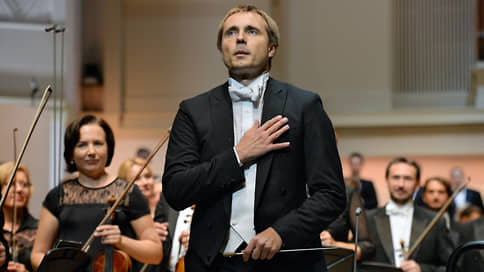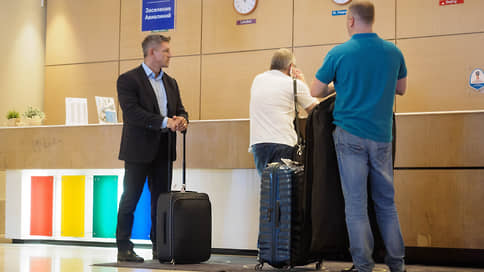Conductor Vasily Petrenko about the premiere of « Boris Godunov » in Amsterdam

In the Amsterdam Dutch opera, premiere shows of the opera of the Mussorgsky Boris Godunov are in the production of Kirill Serebrennikov. The musical director of the play was the famous conductor Vasily Petrenko, in 2021–2022 – artistic director of the Russian State Core named after Svetlanov. About who is the main character of Boris and how to understand this opera to the viewer, unfamiliar with Russian historical realities, Vasily Petrenko told Vladimir Dudin.
– This “Boris Godunov” is probably not the first in your conducting account?
– Not the first, no. For the first time, I acted in this opera as a soloist of the boys choir in the production of Andrei Tarkovsky in the Kirov Theater in Leningrad, and as a conductor for the first time participated in the production of the Mussorgsky Mussor and Ballet Theater in St. Petersburg. Then, in 2007, there was a production in Reisoper in Holland (director Robert Lemair) and in the Bavarian opera in 2018 and 2023 in the direction of Caliko Biiteo.
– And how do you like the concept of Kirill Serebrennikov in comparison with Biite?
– It turned out, in my opinion, not so much more radical as based on a more live knowledge of Russian reality. And the message of Mussorgsky – it goes from Pushkin, where it is written about the relations of the authorities and the people, the torment of conscience, in a word, eternal problems. The specifics of this production suggested the tremendous artistic efforts of the choir, which is the main character – collective, but with many individual stage tasks, which is very difficult to unite in the process of execution. In addition, it took a lot of work to explain the plot to the international composition of our soloists, to teach them the correct pronunciation, an understanding of the old language, which has been written by most of the libretto. It was not easy, but very interesting.
– Unlike the productions of Boris with foreign directors, with Kirill Serebrennikov, you agreed in the same language. In the process of rehearsals, did he consult with you?
– Yes, we were constantly in contact with him, he even realized some of my ideas in directing. The production of any opera is the co -creation of the conductor and director, there must be a search for organics between them, otherwise music and action will be separately. The difference is that the director almost always has the right to make a mistake and a significantly larger field for creativity, because there are not many remarks in the score about stage action. And for the conductor, any inaccuracies and errors are instantly heard in the “Real Time”, therefore the level of responsibility at the performance above. Of course, for the Russian director, a huge number of subtexts and events in Boris Godunov is more understandable. Cyril and I were unanimous from the very beginning in the fact that Boris Godunov is an opera about the people, about how they use it when he is silent, and when he seems to be silent. And about what catastrophic consequences behind all this in our history arose.
– Which of the opera editors did you use?
– The “Oxford” editorial office in the original orchestra, which includes both the prologue and the Polish act, was based on our production, but we slightly expanded it, leaving all three scenes in the fourth act – “Blessed Vasily”, “Faceted Chamber” and “Kroma”.
– As I understand it, it was especially difficult with choral scenes?
– Yes, and from the point of view of the artistic filling of roles, and from the vocal side. The chorists in this performance are almost all the time in separate cells of “apartments”, so it was not always possible to hear each other, and the orchestra is heard much worse from there. To bring everyone to a single ensemble was a great and difficult task, especially despite the fact that the director worked out almost every stage image. But the choir in the Amsterdam opera is one of the best in the opera world, they always responded to the need to work, so that the month of rehearsals passed without special excesses and with great enthusiasm.
– And how should Boris sound today, in the sense of a common conducting interpretation, in your opinion? Holestko and merciless or, on the contrary, epic and detached?
– “Boris” should always be performed as close as possible to the score, finding a natural rhythm and movement in this large radical, especially for its time, opera. In the end, for the viewer, unfamiliar with Russian history and realities, it is the music that gives more to understanding of the opera than, say, scenography. Amsterdam ConcertgeBouw is a magnificent orchestra with its style, sound and traditions. However, they participate in the opera for only one setting a year, and Boris Godunov was last performed in the last century, so they had to tell them and work on a special, “unlearned” coloring orchestration.
– As part of the performers, a lot looks unexpected. What criteria did the soloists choose?
– The casting of soloists, as is almost always the case in modern conditions, is the fruit of the mutual efforts of the theater, director and conductor. The main criteria are their artistic and voice mobility. For many of their role in this production, they became debuts, with the exception of artists who performed Pimen, Rangoni and Shuisky, they sang these parties earlier. The party of Theodore, the son of Boris, in this version, was entrusted to the counteratrador, because for Cyril it was fundamentally so that it was a male voice. The holy fool here sings a dramatic actor – one Byron, he additionally reads several monologues connecting the action and allowing to avoid pauses arising in the breaks of the scene. Pimen sang Vitaly Kovalev, with whom we were well acquainted with the Bavarian opera, where he played this role a couple of years ago, so I knew what and how it would be. And Shuisky was a Chinese tenor with very good training, voice and discipline, which, however, involuntarily gave the performance an additional modern connotation.
“The strongest casting link in this production is obviously – the Polish bass Thomash is finite, which is known around the world as the best Wagnerian bass, an outstanding Votan. Many years ago, he admitted to me that Boris dreams of singing, because he knows the Russian language and loves Russian music very much. Whose idea was it to invite him to a title role? How impressed you?
– Yes, Tomash is known as the Wagnerian singer, and even between rehearsals, he went to sing Votan in Dortmund, and now between the performances in Amsterdam he went to Bayrete at the rehearsal of summer prime ministers. He also told me that Boris wanted to sing for a long time. It was not easy for him, since the king was still more humanized than the inhabitants of the Wagnerian myth. Tomash speaks very well in Russian, which, of course, helped him, plus we conducted a lot of individual lessons with him, mainly working on “cleaning” of everything that was generally alloyed, superfluous in singing and emotions. At the premiere performance, he sang excellently, I assume that his further evolution in this image will become impressive. But still, the paradox of this production lies in the fact that, despite the name, the main character is still not the king, but the choir-the people, his life, aspiration, suffering and tragedy.
– Is the operas in your conducting graphic schedule?
– I would like! Recently, there was a concert performance by Iolanda in Albert Hall, the third act of Parsifal in Oslo, in the next seasons performances in the Bavarian opera, Zurich opera are planned, possibly in Berlin and Koven-Garden, but I still can’t disclose all the plans. Now I’m finishing the fifth season as the Royal Philharmonic Orchestra art director in London, not so long ago the contract was extended until the end of 2030. And in Liverpool (as in Oslo) I am now Conductor Laureate, I return there every year for one to two weeks. And so I have a lot of engagements around the world – until the end of summer I must act, except Amsterdam, London and Liverpool, in Brazil, USA, Austria, Italy, Germany and Switzerland.







